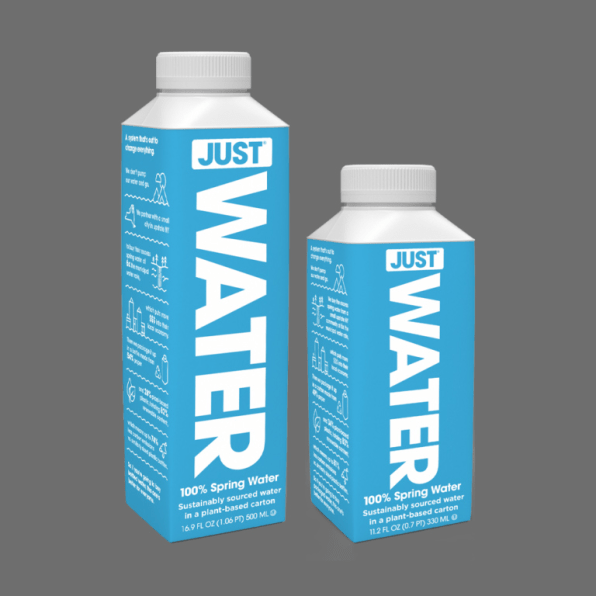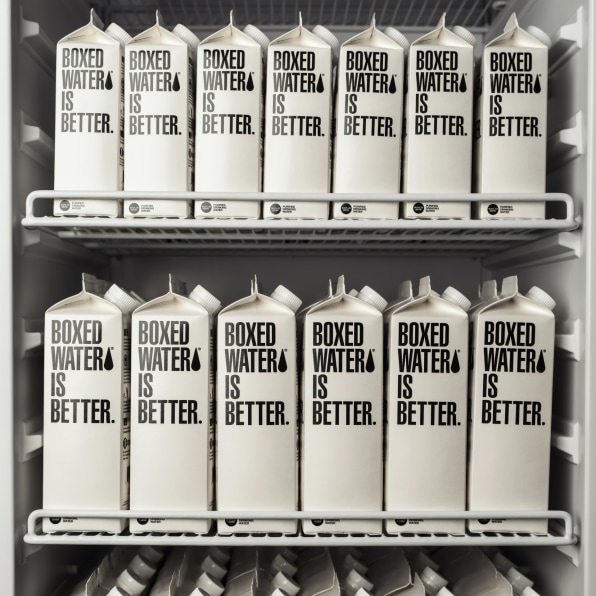When Jaden Smith was 11 years old, he was so concerned by the problem of plastic waste that he decided to try to find a solution himself, helping launch a new company called Just Water that sells water in containers that are mostly made of paper rather than plastic. Other companies are taking a similar approach. A brand called Flow uses essentially the same packaging. A brand called Boxed Water is Better, as the name implies, also uses cartons and markets itself as more sustainable than the plastic alternatives. But shifting materials, despite the best intentions, doesn t necessarily solve the problem of waste and might not even shrink the carbon footprint of the packaging compared to some plastic bottles.
advertisementadvertisement [Image: Just Water]A carton made by Tetra Pak, the manufacturer that produces packaging for Just Water (and soup, soy milk, and many other products), includes multiple layers of paper, plastic, and aluminum. While it is recyclable if it s sent to a facility with specialized equipment, many cities still don t accept the packaging, in part because they may not have enough volume to make it worthwhile to sort out the containers from the rest of the waste stream. Tetra Pak and manufacturers making similar packaging have worked to increase the number of cities that accept cartons a decade ago, just 18% of households in the U.S. could recycle this type of carton, and now 62% have access, in cities from Seattle to Des Moines.
[Image: Just Water]A carton made by Tetra Pak, the manufacturer that produces packaging for Just Water (and soup, soy milk, and many other products), includes multiple layers of paper, plastic, and aluminum. While it is recyclable if it s sent to a facility with specialized equipment, many cities still don t accept the packaging, in part because they may not have enough volume to make it worthwhile to sort out the containers from the rest of the waste stream. Tetra Pak and manufacturers making similar packaging have worked to increase the number of cities that accept cartons a decade ago, just 18% of households in the U.S. could recycle this type of carton, and now 62% have access, in cities from Seattle to Des Moines.
The carton industry (which includes everything from the multilayer Tetrapaks to milk cartons) is also pushing for new solutions, including robots that can automatically identify cartons at a recycling facility. But most cartons still end up in landfills at the moment. In some other countries, like Vietnam, some cartons end up dumped on beaches and in the ocean.
To me, it s a little bit ludicrous to put your water in a carton and claim that that is more sustainable than putting it in a plastic bottle which is, in fact, more readily recyclable, says Darby Hoover, a senior resource specialist with the nonprofit Natural Resources Defense Council. The recycling rate for PET, the type of plastic used to make bottles, is still dismally low, at 29.2% in the U.S. by the most recent statistics. But it s still significantly higher than the current rate for cartons, at 16%. And a plastic bottle can be recycled into a new plastic bottle; new recycling technology means that the process could happen infinitely in a closed loop.
True recycling means you re putting something back into a production system and ideally creating a similar type of product as it came from originally, says Hoover. Some facilities have a sophisticated process to recycle cartons. Sustana, a paper company, uses patented technology to separate paper from plastic after cartons go through a giant blender-like machine called a hydropulper. (The company uses the same technology to recycle coffee cups.) The fiber, which is high-quality, gets recycled into other paper products. The company doesn t have enough volume of the other materials, like plastic and aluminum, to recycle them individually, so they get made into animal bedding. Another recycler makes cartons into building materials. These steps represent progress, but aren t a complete solution to fully recover the materials that went into making each package.
 [Photo: Boxed Water/Boxed Water]
[Photo: Boxed Water/Boxed Water]Just Water s packages are made from 54% paper (harvested from Forest Stewardship Council-certified forests), 28% plant-based plastic, 15% protective plastic film, and 3% aluminum. The cartons ship flat, meaning that they take fewer trucks for transportation. Over the full life of the product, the company says that it reduces emissions by 50% compared to a new plastic bottle. That s good but a plastic bottle made from 100% recycled plastic may actually reduce emissions even more. The Association of Plastic Recyclers has calculated that using recycled plastic reduces emissions by at least 67%. Most major manufacturers are now moving toward recycled plastic; Nestl Waters, for example, now sells its Pure Life brand in 100% recycled plastic bottles.
We re always working closely with Tetra Pak to evaluate how we can further push the sustainability boundaries of our carton, says Just Water CEO Ira Laufer. The next step will be to transition some of the layers of film used in sugarcane-based plastic, which will further reduce the climate impact of our carton. At Just, we re happy that we can offer an option in the market that is a step in the right direction. There is no perfect solution available anywhere. A lot of smart people and motivated brands are looking to create that perfect solution because we all recognize that it s necessary, but it simply doesn t exist yet. The company is also exploring the use of recycled material.
advertisementSpurred by consumers who no longer want to buy plastic, several brands are also selling water in aluminum cans. Around 50% of aluminum cans are recycled, far more than plastic bottles but even recycled cans contain some new aluminum that still has an environmental footprint, including a mining process that pollutes water. The best option, fundamentally, is to completely avoid single-use packaging for a product that is easily accessible from the tap. In the middle of the last century, bottled water was virtually nonexistent in the U.S.; when Perrier showed up in restaurants in the late 1970s, it still wasn t common to walk down the street carrying water. It wasn t until brands started packaging water in PET plastic in the late 1980s that bottled water started to become popular, and people began to think that they needed access to water at all times.
Now, reusable bottles are also ubiquitous; though tap water in the U.S. is sometimes unsafe, there s little reason that most people should ever need to buy water in any kind of packaging. In most situations, it is not necessary to have disposable water bottles of any type, and what material you use is secondary to that, says Hoover. Any material is going to require resources to produce and to recycle, and may or may not be recycled.
Some companies are finally beginning to make efforts to move beyond single-use bottles. (Just Water, it should be noted, designed the top of its bottle to be easy to refill, though it s not clear how commonly consumers reuse the containers). Coke is expanding tests of bring-your-own-bottle water vending machines. PepsiCo bought SodaStream in 2018. As part of Loop, a new reuse platform, Evian is experimenting with selling water to customers in Paris in glass bottles, then taking back the bottles and cleaning and refilling them.
I think it s going to be more about how these water companies are evolving into new delivery systems and thinking about using fountains and reuse, and integrating that into their business models, says Bridget Croke, who leads external affairs at Closed Loop Partners, an investment firm focused on the circular economy. I think that s where the most serious innovation is going to happen, and that s going to be the most catalytic. I think the evolution that s going to happen isn t about a material.
advertisementadvertisementadvertisementAbout the authorAdele Peters is a staff writer at Fast Company who focuses on solutions to some of the world's largest problems, from climate change to homelessness. Previously, she worked with GOOD, BioLite, and the Sustainable Products and Solutions program at UC Berkeley, and contributed to the second edition of the bestselling book "Worldchanging: A User's Guide for the 21st Century."
Ideas Newsletter
Sign UpReceive special Fast Company offers.See All NewslettersVideoImpact






 [Illustration: FC]
[Illustration: FC]